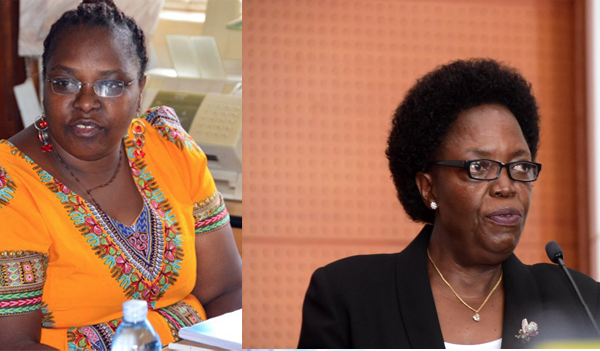Women push for more top positions at public varsities

Ms Euzobia Baine, principal investigator and Prof Mary Okwakol, the director of NCHE.
A group of educationists have called for more top leadership positions in public universities to be ring-fenced for women, arguing that the current number is worryingly low.
According to a survey done in six public universities, including Makerere, Gulu, Kabale, Muni, Busitema and Mbarara University of Science & Technology, the number of women in leadership positions and on decision-making organs leaves a lot to be desired.
“The report states that in a period of 16 years, the number of women in high positions in Makerere University increased only by seven per cent, from 22 per cent (920) in 2004 to 29 per cent (1,355) in 2020, which is a very slow progress,” Ms Euzobia Baine, the principal investigator of enhancing women’s participation and visibility in leadership and decision making in universities in Uganda, said yesterday.
The report states that despite various interventions and achievements in increasing female staff in Ugandan universities and other public institutions, glaring gaps remain in women’s participation in decision-making organs.
“Institutions are missing out on the contribution of women in leadership and decision making. They are not effectively contributing to the national and international development agendas such as Uganda National Development Plan, African Union Agenda 63 and many more,” Ms Baine said.
She cited two main issues that bar women from attaining top leadership positions -- institutional policy framework and patriarchal nature of Ugandan institutions.
Gap
“There is a disconnection between the intention of the laws and implementation within the institutions and there a lot of assumptions that go on in the issue of women in leadership,” Ms Baine said.
“We want to make sure that where we need participation of women, we must be clear what exactly the targets are. If we say we have a national gender policy which does not relate with tertiary and institution Act, this does not work. The two need to speak to each other so that we are able to move in the proper direction.”
Ms Baine also said a Ugandan university women think tank, which will establish and maintain a monitoring and tracking system for gender representation in recruitment, promotion and leadership in public universities, is in the offing.
Prof Mary Okwakol, the director of National Council for Higher Education, acknowledged that women are underrepresented in leadership and decision-making organs of universities in the country. She added that any programme to support women should be backed by the institutional level policies and these should include short courses, workshops and training, which should be coupled with monitoring of women’s progress from department level to examine the situation of women.
“There is a need for institutions to formulate and review equal opportunity policies that take into account specific barriers and which are gender responsive like recruitment, development and promotion all have to come out in these policies,” Dr Okwakol said.



